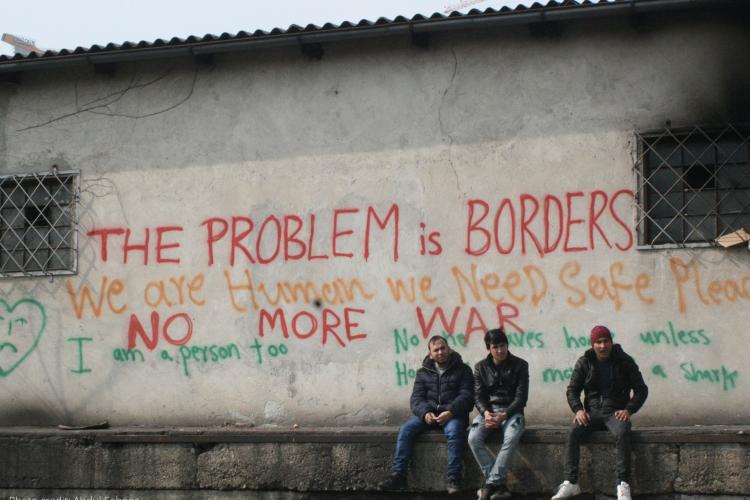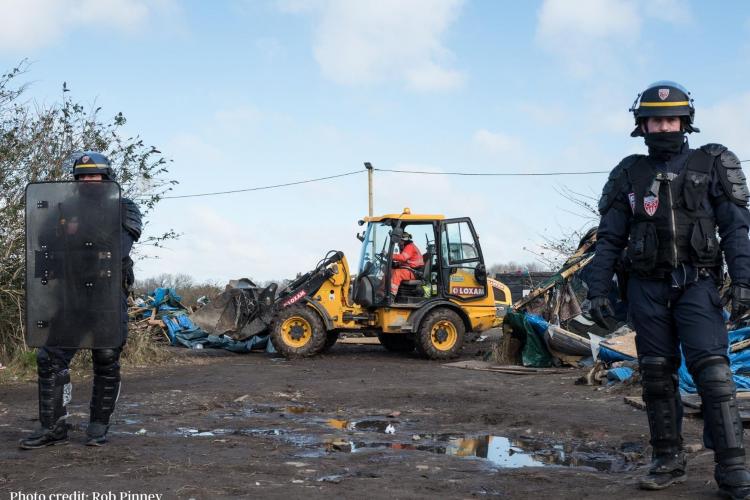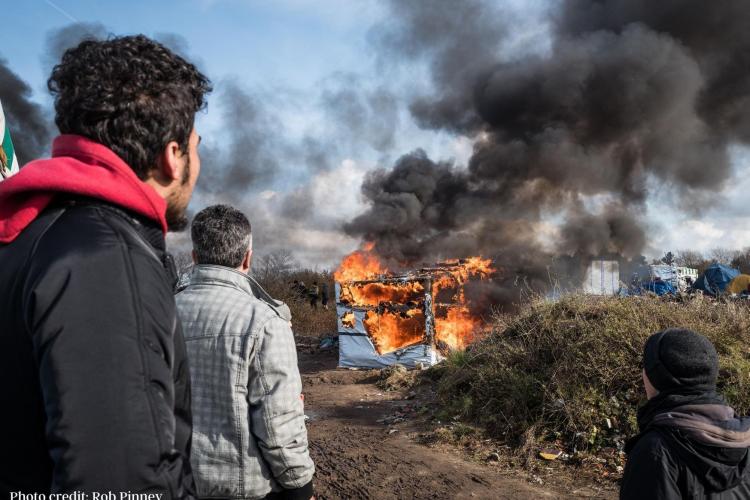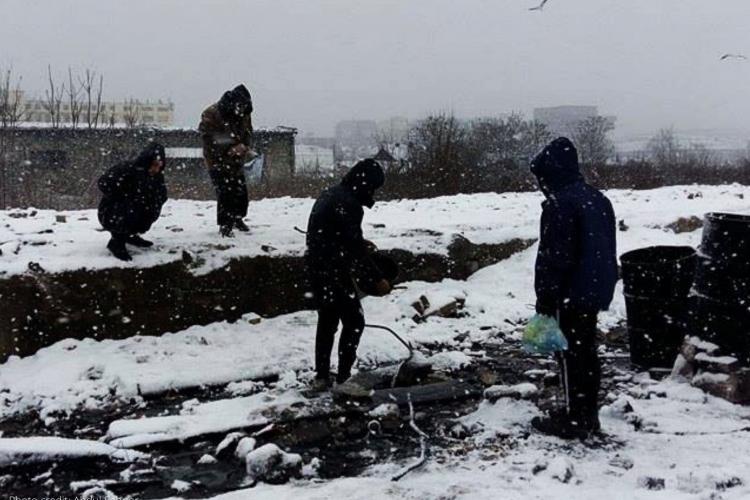Politics of Exhaustion: Reflecting on an Emerging Concept in the Study of Human Mobility and Control
Posted:
Time to read:
Guest post by Dr Leonie Ansems de Vries and Marta Welander. Leonie is Senior Lecturer in International Relations and Chair of the Migration Research Group at King’s College London. Marta is a doctoral researcher and visiting lecturer at the University of Westminster in London and executive director of Refugee Rights Europe. In this blog, they reflect jointly on their concept ‘politics of exhaustion,’ which first came to life in the context of the so-called Calais ‘Jungle’ camp in 2016.

Exhausted
“I just slept and slept and the detention centre staff thought I was dead. I slept all day and night. They came and woke me up, because they thought I was dead. I couldn’t eat for three days, so the doctor came to examine me […] I was sleeping or daydreaming, so the breakfast, lunch, and dinner was just sitting there waiting for me. I was so exhausted.”
Through these words, N., a young woman from East Africa, recounted how she felt upon arrival in the UK to seek asylum, following years of exposure to the detrimental mobility management practices which we have called ‘politics of exhaustion’. While N. had evidently persevered despite its emotional, psychological, and physical effects and reached the UK, many others do not. Many thousands of displaced people across Europe are subjected to policies and practices that exhaust them whilst some tragically perish.
More than four years since we coined and developed the notion of ‘politics of exhaustion’ in the context of the so-called Calais ‘Jungle’ camp in northern France, we come together again to reflect on the ways in which the concept has been mobilised to analyse, diagnose and make sense of practices of control and resistance in Europe’s borderlands.

What is ‘politics of exhaustion’?
In early 2016, we met up in London to exchange thoughts on our (separate) research projects in borderland Europe, and especially our experiences in Calais. We were both struck by the prevalence of narratives of exhaustion among people in informal spaces of transit. So often, we heard people speaking in terms of ‘being so tired’ and of having been ‘completed exhausted’ by repeated evictions, detention, push-backs, deportations, sub-standard living conditions, fundamental uncertainty, the continuous threat and reality of violence and a range of other circumstances and practices that wore them down.
We felt that we should highlight this lived experience of physical and structural violence in our work and seek to counter it in our practice. Yet, we also agreed that this was only one dimension of how exhaustion was at play. Exhaustion could also be understood as a technology of governance; a way of pushing people to the edge, directly or indirectly. It was a politics of exhaustion, part of a broader set of practices of so-called “migration management” and closely entangled with people’s struggles to move and find a place to stay.
The notion of politics of exhaustion was born and we have developed and refined it since, both individually and jointly. In brief, it refers to the ways in which exhaustion is employed as a tool of governance and control and how it is endured and resisted as a lived experience by people forced to move (or forced not to move) and those working in solidarity with them. It highlights the violent nature and impacts of the management of movement – its accumulated effects over time and across spaces. This includes violence that is direct and physical, violence that slowly creeps up, closing in on you, violence that attaches to your body, violence as neglect and abandonment, and violence that is expressed in terms of humanitarianism.

Violent governance and struggles for mobility
Nearly five years down the line, the concept of the politics of exhaustion has served to analyse border struggles across Europe, undergoing changes and developments in multiple interdisciplinary directions. Marta has explored the notion through in-depth field research of the control of mobility and migrant resistance in Calais, Brussels and Paris (2018, 2019a, 2019b, 2019c, 2020a, 2020b, 2020c). Through embodied encounters with border struggles, she has shown how control and resistance are enmeshed in the politics of exhaustion.
Drawing on the voices and experiences of 75 migrant interlocutors and other informants with first-hand experience of the UK-France borderzone, she argues in her PhD thesis that the juxtaposed border arrangements between the UK and France have not only moved the UK’s physical border to an extraterritorial space; the border has also entered into migrants’ everyday lives through more insidious, temporal, and corporeal biopolitical technologies of bordering. This consists of an array of tactics devised to render life governable and pliant, and bodies docile, with the premeditated intention to negate people’s autonomy, agency, well-being and self-efficacy, and with the ultimate aim of curbing autonomous migratory movements, influence decisions, and manage intent through the physical, mental, and emotional exhaustion of its subjects.
In this sense, exhaustion is understood as constitutive of bordering processes, as well as of the ‘border’ itself. However, rather than privileging an understanding of power that is totalising, Marta’s work also explores the heterogeneity of ways in which migrants respond to, and shape, through their ability and desires to move, the apparatuses of power, and the technologies of exhaustion, enabling the articulation of new subjectivities. She understands the interlinkages between power and subjectivities as processual, ambivalent, and interwoven, thus mobilising a heterogenisation of the ‘border’.
Leonie’s work (e.g. 2019a ; 2019b; 2020a; 2020b; 2020c ; 2020d) has also highlighted these entanglements of power, resistance and violence, arguing that we cannot understand the (violent) impact of governance through exhaustion without considering people’s struggles to move and find a place to stay. She has developed the notion in a number of contexts. For instance, in relation to arts practice as research methodology, she asks how we can support migrants’ struggles without amplifying the violence of migration governance. She has also reflected on the impact of the Covid-19 pandemic on the politics of exhaustion.
In a co-authored article with Elspeth Guild, Leonie discusses the impact of the protracted character of migration management in formal and informal spaces of transit across Europe. Migration trajectories, rather than a movement from insecurity to safety, are often characterised by recurring or continued displacement: people’s movements are obstructed, contained, forcefully extended, and circulated. The accumulated impact over time and across spaces of this fractured mobility constitutes a politics of exhaustion. Yet, the notion of fracturing can also be deployed to understand people’s struggles for mobility, including the ways in which conventional conceptions of state and citizenship are challenged by the emergence of alternative living spaces, communities and politics on behalf of migrants and those supporting them.
The temporal dimension is also central to a piece on the Bogovadjia camp in Serbia co-authored by Leonie and Lucia della Torre. During her work in the camp, Lucia was struck by the urgency of people’s eagerness to move – listening to camp residents, it seemed that every move was imminent, urgent and rushed –, however, this urgency had become lost (in) time as it stretched over months and years. Their carefully crafted plans kept playing in their heads without being able to act on them, out of fear, lack of resources and/or sheer mental exhaustion. Yet, it is also remarkable how often migrants in Bogovadjia and elsewhere narrate their efforts to move as ‘the game’. Despite the uncertainty and suspension they feel – or perhaps because of it – they assert their active subjectivities through narratives that suggest play, adventure and the prospect of winning, or at least successfully finishing their protracted journeys. Here, again, we see the entanglements of governance, resistance and violence in the politics of exhaustion.
Beyond our own work, other scholars have deployed and developed the concept in various directions. For instance, focusing on the case of Belgium, Robin Vandevoordt (2020) draws on ethnographic work with the Brussels‐based Citizen Platform for the Support of Refugees, and demonstrates how the Belgian state has consciously produced a humanitarian crisis as part of a broader ‘politics of exhaustion,’ whilst also exploring the specific forms and types of humanitarian action that emerge from citizens’ response to these policies. In a different context, Nora Stel (2018) draws on our concept to argue that Lebanon’s manufacturing of refugees’ vulnerability is not merely contingent on capacity and resource deficits associated with state fragility, but is indeed, to a degree, a strategic approach which mirrors European countries’ abandonment and exhaustion.

Future directions
Having established the concept as a way of rethinking what border violence is and how it impacts on people forced to (not-)move, as well as a way of articulating the entanglements of power, resistance, violence and solidarity, we plan to develop the notion in several directions in the coming years, both jointly and separately.
Firstly, in line with our more recent work, we seek to develop a more intersectional understanding of border violence and border struggles, taking seriously structures of violence such as coloniality, racism, patriarchy, heteronormativity and ableism, and considering the differential impacts of exhaustion on different communities. This includes the interrogation of the historical amnesia around colonialism and slavery that pervades the conception of migration – what Gurminder Bhambra calls methodological whiteness. Marta will explore the dynamics of racism and white supremacy within mobility governance through field research activities among state actors who are implementing the politics of exhaustion on a day-to-day basis. Leonie is interested in our own complicities in relations of power-resistance. As privileged white migrants, it is partly for the sake of our smooth mobility – as ‘trusted’ travellers with EU/Schengen passports – that borders are erected that illegalise and exhaust others.
Secondly, and relatedly, Leonie has started developing a broader understanding of forced (non)movement, as not merely related to migrants but also to other racialised and marginalised groups. For instance, the politics of exhaustion is also at play at the intersections of people’s legal status and forced (im)mobility with respect to housing in the UK.
Thirdly, and building on the above, we seek to further explore the entanglements of power and resistance by paying greater attention to people’s active struggles to move and/or stay. So far, we have in our respective work focused on practices of resistance to the politics of exhaustion. Recently, we have come across the work of Akwugo Emejulu and Leah Bassel whose insightful articulation of exhaustion as itself a form of resistance is extremely interesting for our work. Emejulu and Bassel developed their conception of the politics of exhaustion independently of our work, drawing on their longstanding work with women of colour activists in cities across Europe and North America. Struggles against what the authors call the ‘triple crisis’ of austerity, xenophobia, and fascism have a huge toll on the bodies and minds of women of colour; they become demoralised and exhausted. However, they argue that ‘exhaustion operates quite literally as a structure of feeling of mutual recognition’ within precarious collectivities. Whilst this might not shift or crumble structures of violence, it can change the terms of solidarity.
Taking cue from Emejulu and Bassel, and drawing on other intersectional scholarship, in our future work we will further explore the intersections of power, resistance, violence, racism and solidarity through the notions of politics of exhaustion and politics of care.
Any comments about this post? Get in touch with us! Send us an email, or post a comment here or on Facebook. You can also tweet us.
__________
How to cite this blog post (Harvard style)
Ansems de Vries, L. and Welander, M. (2021). Politics of Exhaustion: Reflecting on an Emerging Concept in the Study of Human Mobility and Control. Available at: https://www.law.ox.ac.uk/research-subject-groups/centre-criminology/centreborder-criminologies/blog/2021/01/politics [date]
Share:








